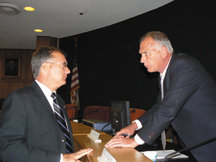Let the finger-pointing begin.
The recent announcement by the Town Council that Secaucus failed to collect a $194,000 impact fee owed by a developer – on top of millions more in uncollected fees and fines owed to the town – has past town officials out swinging.
The administration of Mayor Michael Gonnelli, which took office in January and which uncovered the fact that millions of dollars have for years gone uncollected, has been careful not to blame any specific employees for the lost revenue. Instead, the Gonnelli administration has preferred to focus on staff accountability moving forward.
“There was [in the past] what I call a culture of casualness, a culture that basically allowed people to do whatever and not follow procedure because they knew they probably wouldn’t be held accountable for their actions,” said Councilman Robert Costantino, chair of the Town Council’s Finance Committee. He added, “You see some evidence of this in several [municipal] departments. I can’t tell you who’s at fault, because I don’t know. All I can say is that employees and department heads are being held accountable now and we’re implementing checks and balances to prevent these things from happening in the future.”
“When I was there, we were bringing ratables in; we were brining revenues in.” – Anthony Iacono
________
The town is now trying to collect on at least some of the outstanding debt.
But those in the administration of former Mayor Dennis Elwell resent the indirect implication that such accountability was absent during his tenure, and they claim that some of the uncollected money was the responsibility of others outside the administration to either collect or track.
Look to the Meadowlands
A state agency was supposed to collect and set aside the $194,000 development impact fee Gonnelli recently discussed, according to former Mayor Elwell.
Five or six years ago Baker Residential, the developer of Riverside Court, had agreed to pay Secaucus a $194,000 impact fee, which was to be placed in escrow. Initially the town had hoped to use the money to build a public marina near the 212-unit luxury townhouse development along the Hackensack River. When engineers concluded that a marina at the Riverside site would not be possible, the money was supposed to be used to build a marina at the site of the Old Mill instead.
However, two weeks ago, Mayor Gonnelli announced that Baker Residential never paid the $194,000 impact fee, and thus the money was never escrowed.
Elwell said last week that this was not an oversight by the town or anyone in his administration.
“All of that was really handled by the [New Jersey] Meadowlands Commission,” said the former mayor. “They basically negotiated the agreement with the builder, Baker Residential. Mr. Gonnelli is making it sound like it was my administration’s failure. The Meadowlands Commission was going to get a bond from Barker Residential. There were never any conversations about the town getting the bond. At that time the Meadowlands Commission did not allow towns to [directly] assess fees on development projects.”
Former Secaucus Town Administrator Anthony Iacono, who worked in Elwell’s administration until fall 2007, remembers it similarly.
“Anything that would be put in escrow would be done through the Meadowlands Commission, not with the town,” said Iacono. “The Meadowlands Commission was the one that gave out the approval to the town [to do the marina and to collect the impact fee].”
But a 15-page agreement between the Town of Secaucus and Baker Residential dated Oct. 21, 2002 regarding the marina does not mention the $194,000 impact fee, nor does a separate document from the NJMC approving the marina design.
The state agency supplied these documents at the Reporter’s request, but did not have any further comment on the matter.
More missing money
And what about the some of the other money that apparently went uncollected?
With regards to $750,000 in uncollected false alarm fines, Iacono, who is now the business administrator in Passaic, said, “You will never have a 100 percent collection rate. No matter what you do, no matter how hard you try, some fines will go uncollected. Secaucus is no different than any other city. I don’t know what Secaucus brings in in court fees these days. But I know that here in Passaic we take in about $3 million, so realistically, $600,000 may go uncollected. That’s within an acceptable scope.”
Administrators, he noted, have to make tough decisions about how to allocate limited staff resources and don’t always have the “manpower” to chase after every dollar owed to the municipality.
“When I was there, we were bringing ratables in; we were brining revenues in, and we had eight years without a tax increase,” he said. “So we were doing something right.”
Iacono has said in the past that the town’s grants writers should have tracked grant money that was owed to the town.
The $4.8 million in special assessment fees had yet to be charged, Elwell said, because some of the work had not been completed, and property lines for some lots needed to be redrawn, which would impact the amount of money those property owners had to pay.
The former town administrator commended Gonnelli’s pursuit of the uncollected money, but noted, “It’s not a reflection on somebody not doing their job, and it’s not a reflection of the past administration. When we were office, we also held our department heads accountable.”
E-mail E. Assata Wright at awright@hudsonreporter.com.
